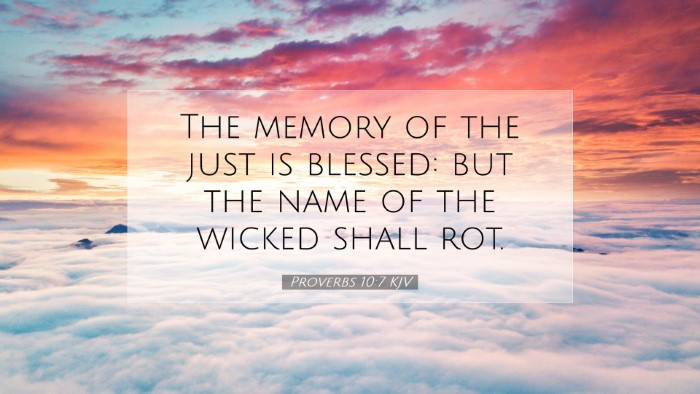Commentary on Proverbs 10:7
“The memory of the just is blessed: but the name of the wicked shall rot.”
Introduction
The verse Proverbs 10:7 presents a dichotomy between the righteous and the wicked, encapsulating a profound truth about legacy and moral conduct. The contrasting outcomes of these two groups reflect broader themes within the Book of Proverbs. This commentary seeks to synthesize insights from classical public domain scholars such as Matthew Henry, Albert Barnes, and Adam Clarke to illustrate the depth and richness of this verse.
Textual Analysis
In examining the Hebrew text of Proverbs 10:7, we see the word "memory" used with regard to the righteous. This refers not only to remembrance in a literal sense but also to the impact and legacy that a person's life leaves behind. The term "blessed" signifies a state of honor, positive recall, and favor from God, indicating that the just are remembered for their virtuous deeds.
Conversely, the “name of the wicked” carries with it the concept of reputation. To “rot” implies decay, destruction, and ultimately oblivion. Thus, the text contrasts two paths—one leading to enduring respect and the other to dishonor and forgetfulness.
The Righteous: A Lasting Legacy
Matthew Henry's Perspective
Henry emphasizes that the ‘memory of the just’ signifies the enduring impact of their lives. Righteous individuals are often commemorated for their wisdom, integrity, and contributions to society. Their virtuous lives yield blessings not only for themselves but also for their families and communities, reflecting the biblical promise in Deuteronomy that blessings flow from obedience to God's commandments.
Albert Barnes’ Commentary
Barnes notes that this verse assures believers of the ultimate recognition and honor that await the just in the eyes of God and men. He argues that the “memory” pertains to the noble traits and actions that are preserved in the hearts of others, creating a legacy that informs future generations. This legacy serves as a guiding light, encouraging others to pursue righteousness.
Adam Clarke's Insights
Clarke elaborates on the concept of "blessing." He indicates that the righteous are remembered not only in human testimony but also in divine endorsement. Their memory is tied to God's covenant with them, and it remains an everlasting truth that does not fade. The idea of being “blessed” permeates through both lives lived righteously and their remembrance after death.
The Wicked: Consequences of a Flawed Life
Matthew Henry's Observations
Henry starkly contrasts this with the wicked, whose names shall “rot.” His analysis points out that the lives of those who disregard God's statutes lead to a legacy devoid of respect and remembrance. Their actions not only alienate them from God’s favor but also cause them to be forsaken in the memories of their peers. Henry stresses the inevitability of moral decay in a life spent in transgression.
Albert Barnes’ Take
Barnes concurs, emphasizing that the “name of the wicked” symbolizes both their moral failure and the decay of their reputation. The negative impact of their lives not only affects them but also serves as a cautionary tale for the living. In essence, evil deeds mar one's legacy, leading to a lack of honor and disrepute, which can be seen in both life and death.
Adam Clarke's Warning
Clarke warns of the transient nature of the wicked's fame. Even if a wicked person achieves worldly success, such accolades are hollow and cannot stem the decay of their character. Their legacy is one of shame, and this is vividly illustrated in their obscurity and the eventual fading of their memory from the annals of history.
Theological Implications
This verse encapsulates vital theological themes regarding righteousness, justice, moral virtue, and the nature of sin. The blessed memory of the just affirms the belief in divine reward for godly living, while the decay of the wicked's name serves as a stern reminder of judgment and consequences.
The stark imagery presented here functions as both an encouragement and a warning. For pastors and theologians, Proverbs 10:7 serves as a springboard for preaching on the importance of living a life that honors God, creating a lasting impact both for the present life and for eternity.
Practical Applications
- Modeling Righteousness: This verse calls for believers to be vigilant in their conduct and character, ensuring that their lives bear testimony to God's truth.
- Legacy Building: The concept of ‘memory’ espouses a proactive approach in building a godly legacy—encouraging individuals to invest in acts of kindness, justice, and truthfulness.
- Teaching the Next Generation: The teachings of the righteous should be imparted to future generations as a guide, embodying the assurances of Proverbs 10:7.
- Awareness of Consequences: Understanding the fate of the wicked encourages a pursuit of holiness and accountability, prompting a life reflective of Christ-like values.
Conclusion
Proverbs 10:7 encapsulates a timeless truth that resonates through generations. It serves as both an encouragement to the righteous and a warning to the wicked. The insights from esteemed commentators deepen our understanding and application of this verse, reminding us that our choices today bear significance for our legacies tomorrow.


